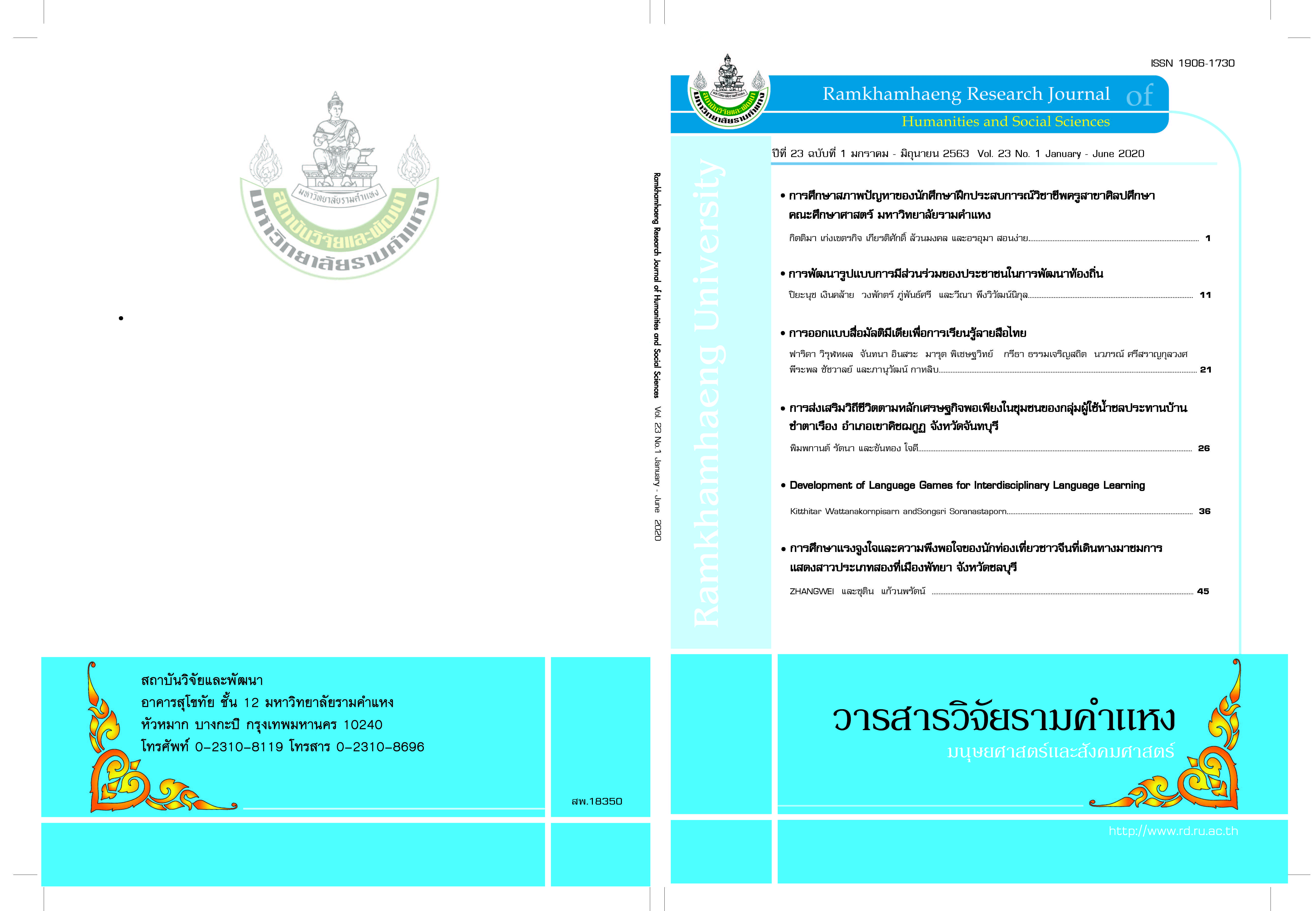Development of Language Games for Interdisciplinary Language Learning
Main Article Content
Abstract
Language learning strategies are fundamental for the understanding of any language. A number of instructional instruments have been introduced to enhance students’ learning strategies. Language games are one of the instruments gradually applied in classrooms in order to foster students’ learning capabilities. This article is aimed at explaining the development of language games to improve students’ language learning strategies. The development of language games has been presented through the ADDIE instructional design consisting of five phases, analysis, design, development, implementation, and evaluation. The instructional theory of Robert Gagné was also employed consisting of nine events of instruction: gaining attention, informing learners of the objectives, stimulating recall of prior learning, presenting the stimulus, providing learning guidance, eliciting performance, providing feedback, assessing performance, and enhancing retention and transfer. Findings from this study are the development and implementation of language games such as rhyming games and word sort games.
Article Details
ใส่ข้อความกอปปี้ไรท์
References
Edinburgh course in applied linguistics (Vol.
35): Oxford University Press.
Alqahtani, M. 2015. The importance of vocabulary
in language learning and how to be taught.
International journal of teaching and
education, 3(3), 21-34.
Arnab, S., Lim, T., Carvalho, M. B., Bellotti, F., De
Freitas, S., Louchart, S., De Gloria, A.
2015. Mapping learning and game
mechanics for serious games analysis.
British Journal of Educational Technology,
46(2), 391-411.
Branch, R. M. 2009. Instructional design: The
ADDIE approach (Vol. 722): Springer
Science and Business Media.
Celce-Murcia, M. 2014. An overview of language
teaching methods and approaches. In
Teaching English as a second or foreign
language (pp. 2-14). USA: Sherrise Roehr.
Crawford, C. 2004. Non‐linear instructional design
model: eternal, synergistic design and
development. British Journal of Educational
Technology, 35(4), 413-420.
Davis, A. L. 2013. Using instructional design
principles to develop effective information
literacy instruction: The ADDIE model.
College and Research Libraries News,
74(4), 205-207.
Fulcher, G., and Davidson, F. 2007. Language
testing and assessment: Routledge New
York.
Gagne, R. M. 1976. The content analysis of
subject-matter a dialogue between Robert
M. Gagné and M. David Merrill. Instructional
Science, 5(1), 1-28.
Gagné, R. M. 1965. Conditions of learning.
Goh, C., and Foong, K. P. 1997. Chinese ESL
students’ learning strategies: A look at
frequency, proficiency, and gender. Hong
Kong Journal of Applied Linguistics, 2(1), 39-
53.
Kiili, K. 2005. Digital game-based learning:
Towards an experiential gaming model. The
Internet and higher education, 8(1), 13-24.
Laufer, B., and Ravenhorst-Kalovski, G. C. 2010.
Lexical Threshold Revisited: Lexical Text
Coverage, Learners' Vocabulary Size and
Reading Comprehension. Reading in a
foreign language, 22(1), 15-30.
Lesaux, N. K., and Kieffer, M. J. 2010. Exploring
sources of reading comprehension
difficulties among language minority learners
and their classmates in early adolescence.
American Educational Research Journal,
47(3), 596-632.
Liu, E. Z. F., and Chen, P.-K. 2013. The effect of
game-based learning on students’ learning
performance in science learning–A case of
“conveyance go”. Procedia-Social and
Behavioral Sciences, 103, 1044-1051.
McCarthy, M. 1988. Some vocabulary patterns in
conversation. Vocabulary and language
teaching, 181-200.
Mongkol, N. 2008. A study of vocabulary learning
strategies of the first and second year
students from English department at
Phetchaburi Rajabhat University. (Master
degree Unpublished ), Phetchaburi Rajabhat
University, Thailand.
Nation, I. S. P. 2013. Teaching and learning
vocabulary: Boston, MA: Heinle Cengage
Learning.
Nitisakunwut, P., and Soranastaporn, S. 2014.
Games for English Language Teaching:
Selected Cases. The Shift from Teaching to
Learning: Individual, Collective and
Organizational Learning Through Gaming
Simulation, 857.
O'malley, J. M., O'Malley, M. J., Chamot, A. U.,
and O'Malley, J. M. 1990. Learning
strategies in second language acquisition:
Cambridge university press.
Odden, A., Odden, A. R., and Kelley, C. 2002.
Paying teachers for what they know and do:
New and smarter compensation strategies
to improve schools: Corwin Press.
Oxford, R. 1990. Language learning strategies.
New York, 3.
Praphantateva, B. 2009. The effectiveness of
implementing classroom tasks: a
comparative case study of the effect of
informing or not informing mathayom suksa
one learners of the objectives of the task.
Mahidol University,
Rivers, W. M. 1970. Teaching foreign language
skills. (1981). In: Chicago: The University of
Chicago Press.
Rubin, J. 1975. What the “good language learner”
can teach us. tesolQuarterly, 9 (1), 41-51.
In.
Santos, T. 1988. Professors' reactions to the
academic writing of nonnative‐speaking
students. Tesol Quarterly, 22(1), 69-90.
Schmitt, N. 2008. Instructed second language
vocabulary learning. Language teaching
research, 12(3), 329-363.
Tanwattana, P., and Toyoda, Y. 2018.
Contributions of gaming simulation in
building community-based disaster risk
management applying Japanese case to
flood prone communities in Thailand
upstream area. International journal of
disaster risk reduction, 27, 199-213.
Waiyakoon, S., Khlaisang, J., and Koraneekij, P.
2015. Development of an instructional
learning object design model for tablets
using game-based learning with scaffolding
to enhance mathematical concepts for
mathematic learning disability students.
Procedia-Social and Behavioral Sciences,
174, 1489-1496.
Wang, L. C., and Chen, M. P. (2010. The effects
of game strategy and preference‐matching
on flow experience and programming
performance in game ‐ based learning.
Innovations in Education and Teaching
International, 47(1), 39-52.
Wattanakornpisarn, K., Ratanakul, and S.
Tirataradol, Y. 2019. Flashcard game for
expanding ESP vocabulary knowledge.
Paper presented at the 3rd National
Conference on Education in the Digital
Era, Mahidol University, Bangkok.
Wijaya, H. D., and Devianto, Y. 2019. Application
of Multimedia in Basic English Vocabulary
Learning with the ADDIE Method.
International Journal of Computer
Techniques, 6(1), 57-63.
Wilkins, D. A. 1972. Linguistics in language
teaching: E. Arnold, 1973.
Wion, F. 2008. Feedback on assignments in
distance education. Paper presented at the
24th Annual Conference on Distance
Teaching and Learning.
Zhu, P., and St. Amant, K. 2010. An application of
Robert Gagne's nine events of instruction to
the teaching of website localization. Journal
of technical writing and communication,
40(3), 337-362.


